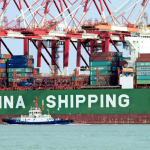If you’re a farmer in the United States, 2019 hasn’t been that good to you. Farmers all across this country are fighting a war being waged on two fronts. This war should concern every single one of us as it may allow for food shortages and prices to spike in the coming months. The first crisis is man-made.
As a result of President Trump’s trade war with China, American farmers are struggling to pull in a profit. The demand for their products is no longer there. While many of our farmers are fighting to make any money in the first place, the second crisis hits: mother nature. This time, it’s not something that can be fixed by man.
Historic rains and flooding across the country has left millions of farmers in a pickle. Before growing season starts, farmers find a good stretch of dry weather in the spring to spread their seeds. The problem is, it just hasn’t stopped raining in many parts of the U.S. That has left a lot of famers worried they won’t have enough time to get their crops in the ground.
Uncooperative Weather
Considering it’s June and farmers haven’t had a solid period of dry weather, many are still waiting. One example is the Hurst family farm in Missouri. Their 600 acres is completely under water after they already planted the fields with corn. They’re considering replanting with soybeans, but other problem is taking root. They’ve already sprayed herbicide for corn. If that herbicide is still in the ground, it would kill any soybean plants.
“It’s just one damn thing after another,” said Hurst, president of the Missouri Farm Bureau. “This one you just sit around and watch it rain ’cause there’s not a darn thing you can do about it.” They, like many other farmers, are struggling with their decision. It’s not an easy one to make. This problem is going to cause a lot of problems for the U.S. economy.
Agriculture makes up 5.4% of our GDP. If farmers can’t get their seed down in time, then that seeps into other industries. A lot of the grain and corn planted go towards feed for animals and other products like ethanol. This is a recipe for disaster. Already broke farmers are risking their entire season, which means demand will go up and supplies will be short.
“Farmers are on the front lines at a time when farm income already pretty low,” said John Newton, a chief economist for the American Farm Bureau Federation. “I think without these trade assistance packages we’d see a crisis across farm country.” Struggling farmers can collect on insurance for the loss, but they need to get their seed in the ground by a certain date.
Many Farms Could Close
Alicia Harvie is the director of the farmer services at Farm Aid. She helps to run a hotline that allows farmers to call and ask for assistance. She has stated that his one-two punch could be on par with the 1980s disasters that ended up forcing the closing of many family farms.
“The average farm family last year made a negative number for their salary,” she said. “What other job do we have where we expect somebody to lose money to do their job every day?” Between the breaking down of trade talks and the bad weather, we’re looking at a poor growing season that could put a lot more farmers out of business.




